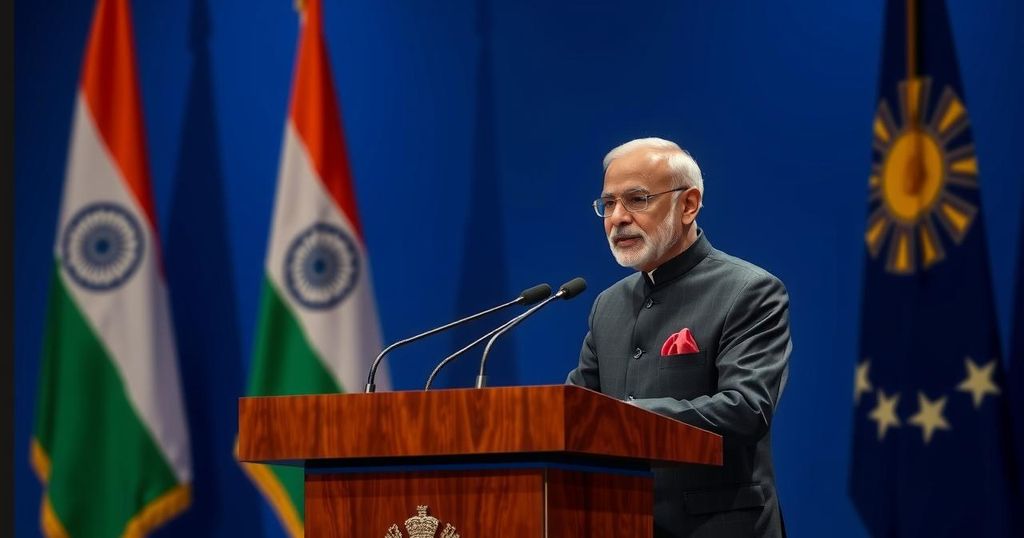COP29 ended in discord as India led a rejection of a climate finance deal criticized for being insufficient for developing nations. Despite developed countries’ celebration of the outcome, concerns regarding equitable commitments and trust in negotiation processes emerged. The adopted financial targets were viewed as inadequate in addressing global climate challenges, particularly for the Global South, which demands more robust support for climate action.
The conclusion of COP29 resulted in significant discord as India spearheaded a rejection of a climate finance deal perceived as inadequate for the needs of developing nations. Despite the enthusiastic reception from developed countries for the proposed climate finance initiative, India and several other developing countries registered their disapproval, emphasizing the necessity for a more equitable and substantial commitment in addressing climate change. Negotiators from the Global South expressed disappointment, asserting that the financial provisions were both insufficient and unjustified in light of the urgency of global climate challenges.
India’s initial rejection of the climate finance framework served as a catalyst for further dissent among developing nations. The proposal set a climate finance target of at least $300 billion annually by 2035, which India argued was insufficient in comparison to the estimated $1.3 trillion needed for climate action by 2030. According to Chandni Raina, the Indian negotiator, this proposal inadequately addresses the needs of developing countries and represents a missed opportunity for effective global collaboration on critical climate initiatives.
Concerns over the decision-making process were also at the forefront of the discussions, with Raina highlighting the lack of proper engagement from the Presidency and UNFCCC officials during the negotiations. The quick endorsement of the proposal decreased trust among negotiating parties and led to widespread sentiment that the global climate agenda was being driven by developed nations’ agendas rather than collaborative international efforts. Various developing countries and advocates agreed with India’s critique, insisting that the adopted agreement failed to reflect appropriate ambition for climate finance.
As voiced by Nigerian negotiators and supported by civil society activists, the perception that developed nations coerced their developing counterparts into accepting inadequate arrangements has emerged as a central theme in the aftermath of COP29. Critics have denounced the framework as a setback, arguing that it does not sufficiently facilitate a transition toward clean energy nor does it provide necessary funding to combat the impacts of climate change effectively.
In contrast, developed countries celebrated the outcome of COP29, touting it as a new era for climate finance, despite the growing dissent from the Global South. Officials from the European Union and UN Climate Change characterized the adopted proposal positively, emphasizing its potential to drive future collaborative efforts and economic benefits. Nevertheless, the contrasting reactions underscore the ongoing rift between developed and developing nations regarding climate finance negotiations and responsibilities.
COP29, the 29th Conference of the Parties to the UN Framework Convention on Climate Change (UNFCCC), assembled representatives from various nations to establish climate finance commitments necessary to combat the adverse effects of climate change globally. The conference aimed to establish a new collective quantified goal (NCQG) on climate finance, particularly to support developing countries that often bear the brunt of climate impacts despite their historical contributions to the crisis being minimal. The negotiations emerged amidst a complex political backdrop, with developing countries advocating for greater accountability and support from developed nations. However, the adopted financial framework has raised alarms among developing nations, as the proposals were seen as inadequate to meet the significant funding needs for sustainable development and addressing climate change challenges.
In summary, COP29 concluded with pronounced disagreements, particularly highlighted by India’s rejection of the climate finance deal, which many developing nations deemed inadequate. The proposed financial commitments were criticized as insufficient, reflecting deeper concerns about the fairness of negotiation processes, trust in international agreements, and the pressing need for robust climate finance mechanisms to support developing countries in their transition away from fossil fuels. As the dialogue on climate finance continues, the divergent views underscore the necessity for a more equitable approach that acknowledges the historical responsibilities of developed nations toward climate action.
Original Source: www.hindustantimes.com






